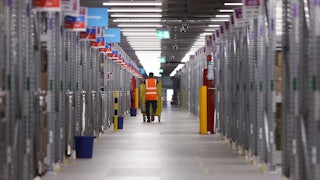DuckDuckGo is increasingly a rarity, when it should be the most standard kind of company in the country. It is a successful, midsize tech company that has built itself by promising to be a search engine that would give users a different interface—one with a lot of privacy protections—from the two leading search engines. But it’s a total outlier because FAANG (Facebook, Amazon, Apple, Netflix, and Google) has built its power on hoarding data and then acquiring or crushing potential rivals.
Like all top-heavy systems, this one can’t last. We should—and soon will—have thousands of DuckDuckGos, all innovating in ways that improve the user experience, competing with each other to improve quality and to serve different sectors of the population that might want different things.
But how do we get there?
While most people think of antitrust as vertical and horizontal breakups—or blocking a merger or divestiture—much of the most powerful antitrust work isn’t about that at all. It’s about enforcing rules that prohibit companies from entrenching their power through illegal, walled gardens. We use the phrase “breakup,” but many of the cases would be more accurately described as an “open up,” where the law serves to pry apart informational monopolies jealously held by a few big companies and to ban contracts that entrench power by punishing competition.
For instance, when Attorney General for the District of Columbia Karl Racine brought his antitrust case against Amazon this summer, he wasn’t asking for a direct breakup. He was asking for an opening up, because Amazon is illegally closing the channels of power. The lawsuit challenges Amazon’s use of restrictive agreements that keep third-party sellers from offering lower prices elsewhere, even on their own websites. If Racine wins the suit, Amazon will be forced to behave more like a platform and less like an octopus, and third-party sellers can innovate themselves, or work with competitors who can also innovate.
Or when Lina Khan, the chair of the Federal Trade Commission, put out a notice about new enforcement policies around “right to repair”—the right of end users to repair electronics free of manufacturer restrictions—the result was Microsoft and Apple opening up, so that small, entrepreneurial companies that had been denied access to important information were suddenly given the keys to provide repair services. Khan’s enforcement statement was like an “Open Sesame” command to Microsoft and Apple.
The economy that emerges from aggressive antitrust action isn’t about isolated companies, but shared public protocols (like the protocol of the seven-digit phone number) that enable entrepreneurship and a robust, interactive economy.
Forced licensing, the requirement of shared protocols or enforcement of bright-line rules against restrictive agreements, isn’t new to antitrust. It may not fit with our image of Teddy Roosevelt on a horse cutting Standard Oil into pieces with his sword. In fact, it defined the work of the late nineteenth century, as the brilliant historian Richard R. John showed in his book Network Nation: Inventing American Telecommunications. To take one example: The telephone became popular only as telephone companies were forced to allow access to the telephone network.
What is new, though, is the scope and nature of the problem. Big data wasn’t around in 1911. The challenge of concentrated data, and the degree to which data constitutes power today, can’t be overstated. When we talk about monopolies, a lot of what we are talking about is data monopolies. Right now, FAANG owns people’s data. On a personal level, that’s an incredibly undignified situation to be in—to have Schmidt, Bezos, Pichai, Zuckerberg, and Cook sitting like jailers above all of us, using our data for their experimentation and profit. On an economic level, it is the biggest single block to innovation and, arguably, to economic growth.
The challenge of data monopolies means three things for antitrust: first, a greater focus on using existing legal tools to demand settlements to open up access, and on litigation that can lead to quick changes in the data power structures. Second, it means we need to pass new laws directed at the particular problem of data concentration. Third, it means getting past the old framework of “vertical” and “horizontal” mergers and contractual restraints. When Amazon bought Whole Foods, it didn’t fit neatly into either box, but it certainly allowed Amazon to cement power in its walled garden by amassing data over its customers.
The appointments of Khan to the FTC and Jonathan Kanter to head the Department of Justice’s antitrust division are strong moves in the right direction. But the state attorneys general play an outsize role. They have started to enforce existing laws in a far more aggressive way: Think of it like tech impact litigation. These cases don’t have to go on for years: If Big Tech knows attorneys general are serious, they can insist on settlements that include agreements to open up access to data and applications. At the same time, attorneys general have a lot of sway when advocating for state law changes that would force access that might be impossible at the federal level.
One of the problems with the “break them up” mantra—and here I plead guilty to having helped popularize it!—is that while people may want it, they are smart enough to know that big divestiture cases can take a decade, and it doesn’t seem like it will change their lives, or the tech industry, fast enough. But once we understand that breaking up isn’t just about dismantling but also about forcing open access, it’s a lot easier to see short-term changes, analogous to the recent right-to-repair changes, that would transform the industry in the short term.
If we enforce existing law and pass new laws directed at the particular problem of data concentration, we can imagine a future where all individuals control and direct their own data—their own history of interactions of shopping and reading—much as they now log their financial activity in a private bank account. The information is kept in a bank but not controlled by the bank, and each person can take it where they want to go. Because antitrust enforcers will break up, open up, and won’t allow the walled gardens to develop, they will be able to shift easily between different service providers, which in turn will allow those service providers to flourish when they provide good services—not just when they engage in lockouts.
We have immense power and public support to open up the app stores and open up online shopping and open up social and open up search. You’ll have greater privacy and control, and along with that, a renewed sense of personal dignity. But we’ll also have riches in innovation we never dreamed of, when the human spirit, human curiosity, and human power to create the unimaginable are unleashed. We simply have to begin to use the tools we already have against the behemoths that are telling us not to.










